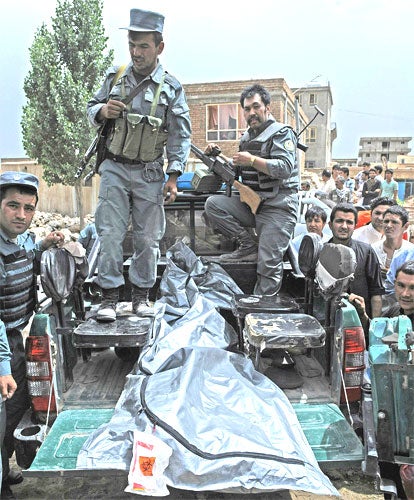Taliban rocket attack shakes peace congress in Afghanistan

Your support helps us to tell the story
From reproductive rights to climate change to Big Tech, The Independent is on the ground when the story is developing. Whether it's investigating the financials of Elon Musk's pro-Trump PAC or producing our latest documentary, 'The A Word', which shines a light on the American women fighting for reproductive rights, we know how important it is to parse out the facts from the messaging.
At such a critical moment in US history, we need reporters on the ground. Your donation allows us to keep sending journalists to speak to both sides of the story.
The Independent is trusted by Americans across the entire political spectrum. And unlike many other quality news outlets, we choose not to lock Americans out of our reporting and analysis with paywalls. We believe quality journalism should be available to everyone, paid for by those who can afford it.
Your support makes all the difference.The Taliban launched a co-ordinated suicide bomb and rocket attack yesterday, interrupting the opening of Hamid Karzai's much vaunted national peace conference and making a mockery of the President's ambitious strategy to end the country's vicious insurgency.
The attack, within half a mile of the gathering in a huge tent defended by some 12,000 security personnel, was a clear statement that the Taliban were not prepare to settle for peace on Mr Karzai's terms. Zabiullah Mujahid, a Taliban spokesman, said that suicide attackers disguised in Afghan army uniforms had opened fire to try "to sabotage and destroy this peace jirga".
The first time a Taliban rocket fizzed past the cavernous white tent in Kabul, President Hamid Karzai cracked a joke. "Sit down, nothing will happen," he told his audience. "Everyone is used to this. Even my [baby] son."
But as the explosions grew closer and more frequent, it became clear that the Taliban was launching an assault on the meeting where plans for an eventual settlement with insurgents by offering jobs and incentives to fighters were to be discussed.
The attack left many of the delegates jittery by the end of Mr Karzai's speech, piling outside as soon as he left the air-conditioned tent. Government reports claimed there were three attackers, who were killed or captured.
Just before the attack, Mr Karzai had called for a national consultation across to work for peace. "The Afghan nation is looking at you. They await your decisions, your advice, so you can show the Afghan nation the way to reach peace, to rescue Afghanistan from this suffering and pain," he said.
The government says that the 1,600 MPs, provincial and district officials, prominent women, businessmen, tribal and religious leaders, and other representatives of Afghanistan's various interest groups need to work out what shape any peace deal with the Taliban should take. "We have representatives from all different walks of life who will decide, whose presence will hopefully bring a breakthrough in the jirga," presidential spokesman Waheed Omar told reporters. "This is the people's jirga and they will be the main representatives... not the government and not the armed opposition."
But with the delegates divided into 28 special-interest groups, thrashing out a workable road map to peace is unlikely during the two working days of the conference. Washington is sceptical about whether the time is right to make overtures towards militant leaders, who have shunned the meeting.
Analysts say it is more likely that delegates will gratefully sign off the "Afghan peace and reintegration programme" that government officials have devised over several months. Mr Karzai "will introduce his mechanism, announce it on the last day and it will get the approval of the jirga", Haroun Mir, a Kabul-based political analyst, said. "He will claim the support of the Afghan people – even though he cannot fight corruption, cannot bring peace and justice. But he needs [international] money for his plan."
Yet there are signs that the programme faces considerable obstacles. There is little detail on how the plan will be carried out and by reaching out to the Taliban, Mr Karzai risks fracturing the coalition of former warlords and powerbrokers he has brought together in his government. Many of Mr Karzai's allies resisted the Taliban regime during the 1990s and the absence of key government figures, such as Karim Khalili, the vice president, could suggest growing tension over this issue.
Western diplomats said a commitment to human rights and the Afghan constitution and the renunciation by the Taliban of all ties to al-Qa'ida were key to any agreement.
Stefan di Mistura, the top UN official in Kabul, praised delegates who remained despite the threat of attack. "We know we are in Afghanistan and not in Switzerland," he said.
Join our commenting forum
Join thought-provoking conversations, follow other Independent readers and see their replies
Comments